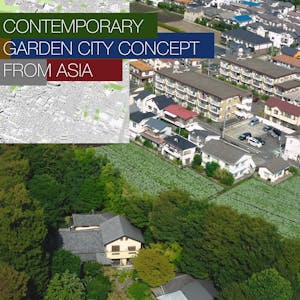Contemporary Garden City Concept from Asia
About this Course
The course focuses on contemporary urban planning issues, particularly the Garden City concept, addressing the global trend of integrating green spaces into cities to combat environmental challenges. Cities worldwide are striving to introduce green elements regardless of location, driven by concerns such as climate change, natural disasters, and political instability. The course discusses the transition from traditional urban structures to dispersed green matrices, emphasizing the importance of green spaces in enhancing resilience. It contrasts Western cities\' vertical agricultural integration with historical Japanese cities\' horizontal integration, advocating for a new approach to urban agriculture. Let\'s consider the concept of a contemporary Garden City, focusing on the symbiotic relationship between urban and rural land uses. Through a mixture of theoretical discussion and practical examples, this course explores strategies for realizing this urban planning vision.Created by: The University of Tokyo

Related Online Courses
This course aims at providing an introductory and broad overview of the field of ML with the focus on applications on Finance. Supervised Machine Learning methods are used in the capstone project... more
Construction Management is the application of knowledge, skills, tools, and techniques to the many activities required to complete a project successfully. This requires both practitioners and... more
Mathematical thinking is crucial in all areas of computer science: algorithms, bioinformatics, computer graphics, data science, machine learning, etc. In this course, we will learn the most... more
Health systems worldwide seek to prevent and treat disease and illness and improve well-being and quality of life. This specialisation focuses on improving the quality of the services provided by... more
By the end of this project, you will have set up your own classroom and be fully confident in how to use Class Dojo. Teachers have a lot of demands on their time as they are pulled in many... more








